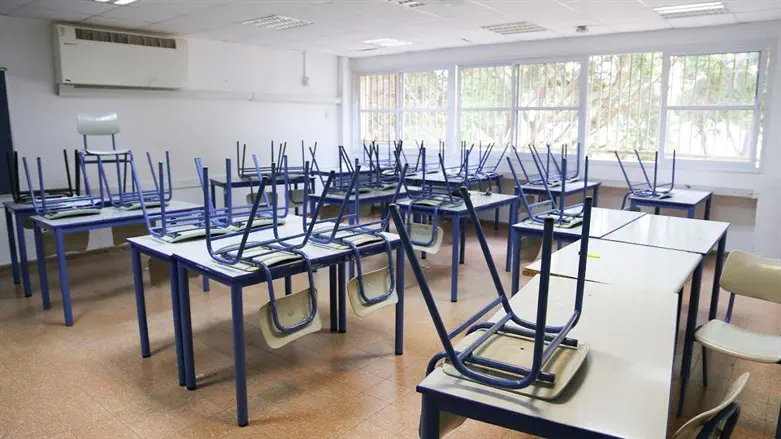
David Scherfer, secretary of the association 'Lamerhav' in Petah Tikva, was interviewed by Israel National News-Arutz 7 (INN-A7). Scherfer represents a group of religious Zionist parents who demand a religious Zionist educational framework that matches their lifestyle but that is not provided by their municipality.
"This is a group of 13 students who, like many other students in central Israel, wish to study in our school. It caters to the Torah public, who, on the one hand, do not want to compromise their Torah-observant lifestyle at home, and, on the other hand, do not want to be sent to a haredi educational institute where they have to give up the values of the state and conscription into the army."
Scherfar says that in the Lamerhav educational institutions there are close to a thousand students. Many of them come from cities and towns in the surrounding area and are not residents of Petah Tikva since not every local authority can provide an answer to every stream beyond the three main educational frameworks: the religious state schools, the haredi, and the secular state schools. Those who want something else go to school outside their cities. It is accepted everywhere."
Compared to what is customary everywhere else, the 13 students in question, 10 boys and three girls, did not receive permission to study in the neighboring city, Petah Tikva. "Already last year, the Ramat Gan municipality decided to adhere to the law enacted in 1959, according to which a student who wants to move must get the municipality's permission. This is a law that is not enforced except in situations where they want to cause havoc, like in this case."
The conflict began two years ago when the Petah Tikva municipality decided that its students would not study in Ramat Gan, and the Ramat Gan municipality responded in kind, deciding that its own students would not study in Petah Tikva either. Scherfer explains that the municipalities are fighting on the backs of the children who are left to sit at home, do not attend any educational institution, and wait for the adults to stop fighting.
"The institutions are not supposed to be part of this story. We are not budgeted by the Ramat Gan municipality and the parents are not asking for financial participation but only written permission to attend school," Scherfer adds. "Per their rights, the parents turned to the Education Ministry, which is supposed to discuss the issue and knows that students move from city to city. The parents requested that the ministry order the Ramat Gan municipality to approve this. The Ministry contacted the haredi unit in the ministry, the unit under which Lamerhav operates. We know from internal sources that, under pressure from the state religious school unit, treatment of this issue was transferred to them, who decided to back the Ramat Gan municipality without reason. The state religious school system is forcefully keeping the pupils at home."
Scherfer says that the parents petitioned the court, which scheduled a hearing for next week, but the pace of the process is not in sync with the children's learning and education needs. The Education Ministry, he claims, is procrastinating to exhaust the parents.
In response to the question regarding the motivations behind the behavior of the state religious school system, Sherfer replies that the people there are idealistic with worthy goals, but, "I cannot defend their actions. In personal conversations with parents, they say that they understand the parents, but their hands tied."
The parents, he says, contacted the state religious school unit director and were told that the issue was being handled in court. However, she promised to look into the issue. The parents are not satisfied with this answer and are calling on the new state religious school council to solve the plight of the students in question as their first act in their term of office.
Shosh Nagar, acting head of the state religious school system, tells INN-A7: "The issue is under discussion in court."
The Ramat Gan municipality responded: "In Ramat Gan, there are high-quality options for the religious and haredi sector with a high school yeshiva for boys and a high school academy for girls. These are considered among the best institutions in the country. Studies in institutions outside the city will be approved if there is no suitable municipal framework."